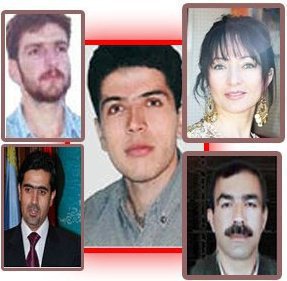 The five Iranians executed in May 2010Our colleagues at Arseh Sevom, pursuing civil society in Iran, profile a new report documenting the violations of the rights of Iranian Kurds, including intimidation, lengthy prison sentences, and the death penalty:
The five Iranians executed in May 2010Our colleagues at Arseh Sevom, pursuing civil society in Iran, profile a new report documenting the violations of the rights of Iranian Kurds, including intimidation, lengthy prison sentences, and the death penalty:
Soon it will be two years since the executions of four Kurdish activists shocked the international community. One of those executed was the teacher Farzad Kamangar, whose plight had been the focus of an international campaign. Ali Heydarian, Farhad Vakili, and Shirin Alamhouli were also hung, as was political prisoner Mehdi Eslamian.
This month the Iran Human Rights Documentation Center (IHRDC) details the repression of the Kurdish-Iranian community and the targeting of Kurdish-Iranian activists in a 70-page report, “On the Margins: Arrest, Imprisonment and Execution of Kurdish Activists in Iran Today". The document reveals reveals a disturbing and shocking pattern of repression and violence by the Islamic Republic of Iran against its Kurdish community.
The May 2010 executions may have stunned those outside Iran, but they were no surprise to the Kurdish community. The report from IHRDC quotes an activist, "While the whole of Iran discovered the brutality of the Islamic Republic of Iran following the election disputes in June 2009, we Kurds have known about it for more than 30 years, from the very establishment of the Islamic Republic."
Kurds have faced repression as both an ethnic minority and a predominantly Sunni group in a Shia country. Although they are Muslims, Sunnis in Iran do not have the same rights as the Shia population, for example, not being able to build a mosque in Tehran.
Before his execution, Farzad Kamangar wrote a series of letters, including this one documenting his treatment in prison, with torture because of his ethnicity and religion.
They took me to a room [where they questioned me]. When
writing down my information [I had to disclose] my ethnicity, and
every time I answered “Kurdish,” they beat me with a whip that looked
like some kind of hose. They also insulted me and beat me because of
my religion. They beat me to their heart’s desire because of the
Kurdish music that was on my mobile phone. They tied my hands, sat me
in a chair, and put pressure on the sensitive parts of my body. They
also took off my clothes and threatened me with rape by harassing me
with batons and sticks. My left leg was badly damaged [while I was]
there, and I passed out from simultaneous electric shocks and blows to
my head. Ever since I regained consciousness, I feel like I have lost
my sense of balance and I shake uncontrollably.
The latest report from IHRDC reveals a pattern of abuse and repression dating back to the beginning of the Islamic Republic, with a focus on the estimate of fourteen Kurds on death row in Iran. Many of those arrested and on death row -- as with the four executed in 2010 -- are not informed of the charges against them, are systematically abused, and denied access to their lawyers. The judicial irregularities defy Iran's own Constitution, which guarantees due process.
Gissou Nia, the Executive Director of IHRDC stated:
Religious freedom, acceptance of minorities and even their protection
should be of utmost concern not only to the international community,
but to the regime of the Islamic Republic of Iran. Arseh Sevom
hopes this report will lead to the release of prisoners of conscience
and to religious freedom.A government’s treatment of its minority communities
serves as a bellwether in assessing the overall human rights record of
any government. The Islamic Republic of Iran and its treatment of the
country’s Kurdish minority is no exception. Today, Kurdish activists
are targeted for arrest, and sentenced to imprisonment and even
execution on thin evidentiary grounds. The government’s treatment
violates protections embodied in both international and Iranian law.
Iranians and the international community should continue to monitor
this behavior very closely.